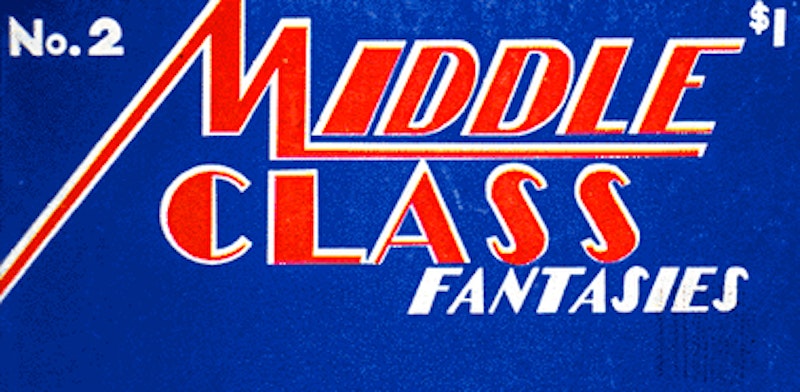I've spent a long time in the closet, but it's time to come out. I've tried to deny it. I've tried to suppress it. Even now as I type this column my hands are trembling as I reveal a dirty secret. I've decided to identify myself as "rich."
That's right. I'm rich. Well, not personally. Right now I'm a graduate student who makes well below the median household income of $44,000. I pay my own rent and such, but I still get occasional support from my parents—my mom, a New York City principal, and my dad, an administrator—who make about four times that. They would never call themselves rich, but maybe they should.
I say this because presidential campaigns are full of bromides about the "middle class." John McCain has come under a lot of fire for his apparent reluctance to say the phrase in debates, probably because he thinks "rich" is someone who makes $5 million (How much is he worth again? Including his wife’s huge fortune, probably upwards of $50 million. Obama is probably worth about $2 million, mostly from book sales).
The problem is everyone in America thinks they are middle class. According to Pew Research, 53 percent of Americans identify as middle class, and 41 percent of those who make under $20,000 do. Here's the rub: many respondents who make over $100,000 will say they are middle class, or "upper middle class," which is really "I'm pretty rich, but I can't just buy Mercedes on a whim, and paying taxes isn't the easiest thing in the world. Plus, 'rich' doesn't sound nice." They may euphemize and say "comfortable" or, at most, "well-to-do." Then, according to Pew, there are four "middle classes:" top, satisfied, anxious, and struggling. Well, maybe I'm weird, but I thought that if you're "struggling" you're probably not in the middle of anything but rather scraping on the bottom.
Who are "the rich" in America? Well, actually, they probably look at lot like John McCain, although perhaps he's too likable. They are mainly nameless CEOs, executives, lawyers, lobbyists who make gazillions of dollars and scheme to screw over the rest of the country for their own gain. How do I know this is the caricature? You see, 64 percent of people who make over $150,000 think the "rich" have too much power in this country, and 77 percent of those who make under $30,000 do too, according a great study done by The New York Times three years ago. Translation: everyone hates the rich! Because nobody is rich.
The problem is some people really are rich. It is much easier to live when you make over $100,000, or even less than that, depending on your location. Sure, my parents complain about money all time. They pay ridiculous New York/New Jersey taxes. They pay the alternative minimum tax. But at the same time, even as the Dow plummets, I don't have to worry about putting food on the table, or paying my bills, or even buying new clothes. Neither do they. They can pay for my brother's tuition in cash. They travel. They are renovating the kitchen. These are big luxuries, and as the economy gets worse, it's important for Americans understand that many of them have been cheated.
Economists have for years complained about wage stagnation. Even as Americans have become productive, their wages have barely kept up with inflation over the last 30 years or so. The recent rise of the minimum wage was paltry, a mere correction (why doesn't it go up every year with inflation?). The real "rich," on the other hand, have seen tremendous gains. They've benefitted from globalization, deindustrialization, and the rising importance of higher education. They've done well.
Meanwhile, our tax policy has not kept up. A guy like Warren Buffett pays a lower tax rate than his secretary because his income is investment income. (Buffett is awesome not only because he's giving away his fortune to charity and singlehandedly saving GE, but also because he refuses to give his kids a huge inheritance, calling it "welfare." I love him. He's right. They didn't work for it).
In an amazing documentary, Born Rich, the heir to the Johnson & Johnson fortune talks to his rich and secretive friends—a Trump, a Bloomberg, you get the idea. It's fascinating to see how ashamed they are about being extremely, obscenely wealthy. The few Europeans he interviewed, on the other hand, were blatant: "there are rich people and poor people. I'm rich. Deal with it." The Americans acted as if being rich was a big secret. No wonder. In America, everyone is supposed to be the same. There is no class in America.
I could rattle off numbers about how many people believe they'll be rich some day, versus how many actually end up rising up the ranks, and how years of bad policy have made it difficult to achieve success. That's another column. But let's just say this: in this current economic meltdown maybe Americans will finally realize we're not all the same. Some people have it easier than others. We need to stop deluding ourselves.
Maybe I'm late with this rant. In fact, many Americans have probably woken up and realized how royally screwed they've been. No wonder John McCain is behind.
I'm Rich
The financial crisis has exploded the myth that there is no class in America.

Detail from this excellent comic cover.
